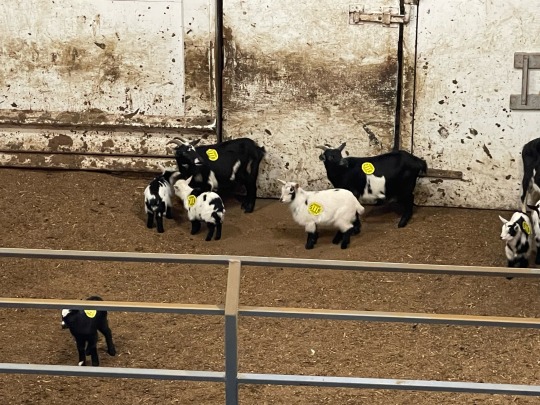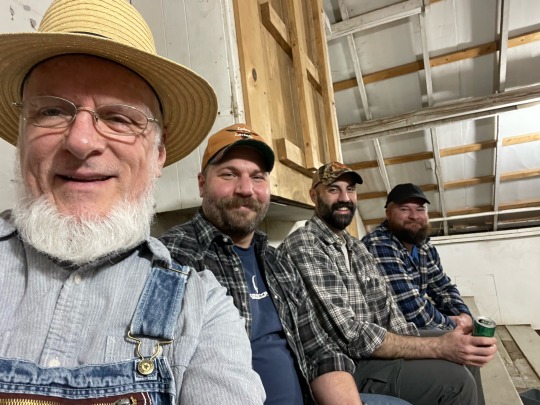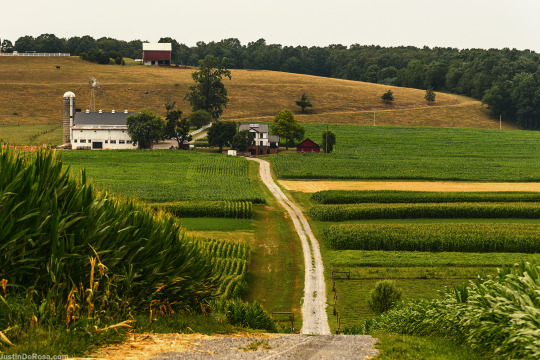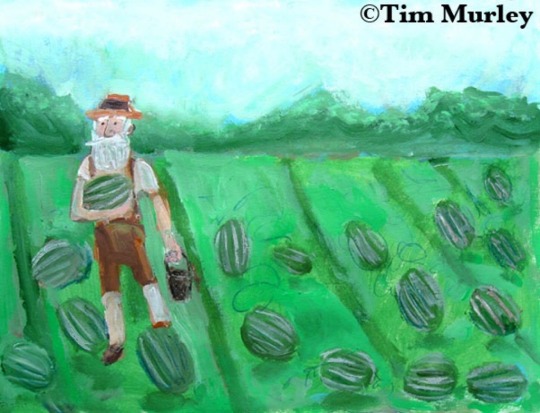#Amish farm
Text

Hay stooks on an Amish farm.
0 notes
Text
Amish Farm Reflection
Rippled by a light breeze, this large pond proved the perfect foreground for this Amish farm near Walnut Creek in Holmes County, Ohio.
© Bruce Stambaugh 2023

View On WordPress
0 notes
Text
Y'all know those fanfics where Saiki is an asshole to Teruhashi or really rude to her until they start dating? Yeah, this is what I imagine what that Saiki meeting Canon Saiki would be like.
Canon Saiki: So do you still deal with Teruhashi?
Fanfic Saiki: I can not avoid that woman. The other day she was bothering me when a mob of her fans showed up so I teleported away and-
Canon Saiki, surprised: You revealed your powers to her?! I mean, her fans do suck, so I can understand panicking and teleporting the both of you away-
Fanfic Saiki: What? No, I teleported myself away and left her there.
Canon Saiki: You what.
Fanfic Saiki: I teleported myself away. Well actually, I was the one who kinda summoned that crowd so that she'd be too overwhelmed with them to go find me-
Canon Saiki, shaking with murderous rage: You what.
#kokomi teruhashi#fanon saiki#terusai#saiteru#saiki kusuo#saiki no psi nan#kusuo saiki#saiki k#the disastrous life of saiki k#tdlosk#saiki kusou no psi nan#Not hate to any fic creators#It's just that I've read several where Saiki is like this#Including one where he fucked with her tarot fortune (which he knew she cared a lot about) to fuck with her head#And while that's a great fic concept and the fic itself was very well written#The concept sent me into a blind rage where I woke up ten hours later in Utah at an Amish farm.#I want to make it clear#This isn't explictly romantic#This can be platonic Terusai#Romantic Terusai#Whatever#But he does love her#And she loves him#It doesn't matter what way#It doesn't matter if they love each other in the same way they love their other friends#Or if it's in a different way#The love is there#And that's all that matters
162 notes
·
View notes
Text




Saturday afternoon at the Rockville Livestock Auction. Think we’ll definitely be back for some baby goats!
#rural life#farm life#me#clown husband#livestock auction#country life#farm folk#Amish auctioneer#mennonites
86 notes
·
View notes
Text

country life
#pennsylvania#lancaster#amish country#amish#farm#rural#rural life#barn#summer#summertime#summer days
87 notes
·
View notes
Link
This has nothing to do with safety and everything to do with obedience. Miller's Farm is healthier and more humane than anything than USDA does, but it is for that exact reason he is now an enemy of the state.
569 notes
·
View notes
Text

Eric Sloane (1905 - 1985)
Amish Barn Door
oil on board
26 notes
·
View notes
Text
genuinely don’t think there’s anything more obvious than when people talk about the amish because you can Instantly tell if they’ve ever actually interacted with amish people or not
#icarus speaks#random post but i’m in Amish Country rn and i got vivid flashbacks to high school#where i argued for like 20 mins with my history teacher#because she was Adamant the amish Never Used Electricity Ever#like. maybe Some amish ppl. i’m not gonna generalize#but a Lot of amish i’ve met are like. fully automated in a lot of places#esp in the farming departments#hell i know a lot of them that have phone lines!!!!#obviously like. no they’re not really on the Internet#but they Communicate. they can have electricity and some even own cars!! like cmon now 😭
24 notes
·
View notes
Text
i forgot to mention that yesterday the doctor brought out this patient to optical who immediately asked, "which ones are the men's glasses?" like, great, we're off to a transphobic start; love that for us. the doc is like, "oh, you know, they're kind of all together." and the other optician takes the chart (thank someone because i am not about to suffer this human). i hear her say, "yeah, and some of them are unisex!" to which he immediately comes out with, "oh, i don't want any of THAT."
like, sir, kindly remove your head from your ass. we're coming for the term unisex now? get the fuck over yourself.
i got distracted with helping my trainee with a woman who couldn't get the deal on sunglasses, but later the guy working front desk was like, "did you catch the horrible vibes off of that guy? 'where are the men's glasses?' shut up! and then he was like, 'that's not how i was raised.' no one cares. sir, this is a wendy's! leave your garbage opinions at home."
thank someone my coworkers aren't shit, at least.
#transphobia#irl#this is in horse and buggy town#no he was not amish#front desk guy is great#work#yeah i don't wear my pride bracelet in this town#but i do wear my lesbian flag ring because let's face it#they don't notice something that subtle#unless they're friends of dorothy#that's not true#i did wear my pride bracelet#until the cop pulled me over#somehow that made me uncomfortable even though he didn't say anything homophobic#also i drive by this farm every day#on the road i got pulled over on#and it has a “farmers for trump” sign#under the most ragged and torn up flags#one american flag and one israeli flag#both of them absolutely look like they've been put through a paper shredder like they are so ripped up#the vibes on that road are abysmal
3 notes
·
View notes
Text

26 notes
·
View notes
Text
Of Loving Grace
Anabaptism, evangelical white women, and Amish novels: how history and fiction affect our neighbors and ourselves
The arts I'm examining this week are film and written fiction, and how they play together to illuminate harm and to reflect changed experiences.
This week, I caught part of a docu-video on Mary Byler, a woman who shares her trauma from living Amish in the United States in the late 20th/early 21st century. You can view it at the link below. I was curious enough about her story to find her public socials. Recently, Ms. Byler hosted several ex-Amish or Amish-related women for a discussion on the harm they say is done by the publishing industry on the psyches of Amish women and how they are perceived in American culture. You probably already have a stereotyped caricature in your mind of an Amish woman right now: demure, happy without electric power or personal agency, part of a loving community. Unless...you live near an Amish community and shop at Walmart with your Amish neighbors. If you've stood in line after work with an Amish neighbor, you might have a different mental image, particularly as there are 50 states with Amish communities and the Amish population is growing, according to both Wikipedia and Lancaster Online. If you hold that caricature in your mind, it's probably time to get rid of it. Byler says it's more than past time because the image is damaging to abused women who seek help outside of the Amish communities but are denied due process because of the perception that the culture-within-a-culture takes care of itself. (Any misunderstandings or misrepresentations of her stance are my own, and I encourage readers to follow the links and determine the stance, themselves.) Unfortunately, court cases like the ones Byler was involved with are proof that there is trouble within a very human community, and, also unfortunately, the ways abuse is dealt with in some Amish communities is to punish the victims.
Anabaptism is on my radar: I'm struggling through taking Church History at Duke Divinity School and reading about Reformation on the European continent. The bloody persecution of Anabaptists is part of that history, and, like their modern-day counterparts, the Amish, there are cultural, economic, and social elements at play along with religious expression. Does the broader American culture that pushes into and drives the economies of many Amish regions remain hands-off on the abuse of women and children with a unique heritage? Is it American patriarchy partnering with Amish patriarchy that leaves women vulnerable to abuse? Probably. In 2024, American women of all cultures and ethnicities face abuse and lack of due process.
Part of the lived cultural experience today, Byler says, is widespread abuse that is obscured by the Amish romance industry's depiction of Amish women. Some novels may describe sacharrin-vanilla characters empty of drive, intelligence, or autonomy. Has a fictionalized depiction of a small demographic caused harm? Byler says it has. Is that depiction limiting the help available to young girls and women living Amish who face abuse on what Byler says is a regular basis? Her panel says it is. You can see both videos below.
youtube
and, this one:
https://fb.watch/qkPqCyyRqK/?
Part of my ministerial training
...involves listening. I need to listen to these women speaking their truth now. For my training, I also need to listen to the voices of the past, the probable ancestors of these women (culturally, if not genetically). Anna was drowned and then burned, as were many Anabaptist martyrs. See if your heart doesn't break reading this:
As a Christian scholar and leader, I need to listen to these women of the present and of the past to acknowledge that harm is done and has been done. After acknowledgement, what do we do? Do we act with justice? Do we turn our eyes away? Do we use our voices in print, or carry them forward in song? Do we march? Do we pray in silence? Does our response matter? To Byler and her guests, our response does matter.
The first response from us, after prayers for humanity, is to buy Byler's book. Just buy it. Rush to buy it, then buy it, and then read it. Tell your friends to buy it and ask your libraries to buy it. Byler has a story that is part of humanity's history and it cannot be ignored or erased. Read her story, mindful of triggers. This is your trigger warning, ok? Buy it here:
THEN,
Go to her website and any of the websites for non-profits she is supporting and support them, too. In these ways, we can actively listen and actively respond with care.
Here is where it gets sticky.
Byler's guest panel discussed an author, Beverly Lewis, known for writing in the current fiction genre. They called out evangelical white women as the audience for the industry, and questioned the readers' motives such as imagining a fairy tale of a simple farm life. Their description reminded me of a 2020s version of the 1970s Little House on the Prairie phase, but with Amish religion instead of Methodist. A complaint I thought I heard from Byler and her guests was the theology infused throughout the books -- white-washed Evangelicalism, not Anabaptist American Amish or Mennonite.
Additionally, they complained of being erased in identity when they expressed their lived experiences, because the fiction is affecting the reality. One panelist was told by a male, non-Amish-related professor that he knew more about being Amish than she. Mansplaining at its finest, right? The lude requests they also received as Amish-related women were really over the top, and yet, so very familiar to any woman in nearly every culture. Fetishism is everywhere and in every time. Who is surprised?
I heard their anguish at professional diminishment. I heard their anger at being traumatized and ignored. And I heard their appeal to other women like me, readers of fiction. They asked us to boycott the Amish novels the way we boycott McDonald's for Palestine and Starbucks for unions. I am willing to boycott, but I've been boycotting Gillette for 30 years for vivisection and Dole for 30 years for violence over vegetable fields, and I, as a single individual, am really, really tired. Also, I was really annoyed that I got lumped into a group of people whose motives were speculated on, but isn't that just life? Can I let that minor annoyance go to prevent true harm against a people? Isn't that part of listening and choosing wisely and with care? Sure, yes.
But.
Is the fiction harmful?
This is the "ourselves" part
On the personal history side.
My grandmother loved novels by Grace Livingston Hill.
She had a set just like the ones pictured below. I'll include a link to buy them, too. Enjoy.

Want to read some? Try this auction:
Grace Livingston Hill novels were Christian fictional novels, clean and full of fluff, and Grandma loved them. She was Church of Christ, through and through, and five generations of our family have followed Church of Christ rules: no female teachers; and women cannot read in Church, serve communion, lead a prayer, or make a financial decision for a church. Women are to let their husbands be the head of the house, which means that men make the decisions for both the church and individual households. All Churches of Christ are independent, but my family had the knack of knowing which CoC was a "true" CoC and which wasn't -- some had pianos, and you know that wasn't going to fly! In my mother's era, no one divorced, no one danced, no one smoked, no one drank, and no one cussed -- in public. Countless relatives have their vices, but we all look the other way, or shame them, depending on who they are, how old they are, and what leadership roles they hold. It was an interesting life, full of love and faith, but not quite "right" for me, and sometimes, quite harmful. Abuse was hidden here, too. Whispers stayed in corners. Let's get back to Grandma.
Grandma was a spitfire, but she followed the rules, for the most part. She did divorce her wayward, violent husband and then remarry a gem of a man, and the couple had many early meetings with church heads before it was all through and they were allowed to marry. The Church of Christ, while no longer my cup of tea, is still full of caring people, and they cared for my grandparents for many years.
Grandma lived on an isolated farm as a young bride, and some of her children, including my mother, were born in a log cabin in the Ozarks. They had rusty trucks to take them to town, but on the farm, they used wagons. In the picture below, this couple is supposed to be my young grandparents, the wayward one and the spitfire, riding away on the wagon. They eventually sold the farm and migrated north to do factory work in Michigan, settling in Indiana. The family has been in northern Indiana for 70 years now. We have brunches at the Blue Gate Inn and spend occasional Wednesdays at the auctions. My grandpa, the one below, used to buy random lots from the Shipshewana auction and refurbish and resell them in front of his house in his retirement. This region holds our shared, intergenerational history.

The original of this photo hangs on my living room wall along with three others of people long passed. We don't remember their names but we still know their faces and their lineage. In 50 years, where will my photos be seen? It won't matter to me!
Grandma loved to take her grandkids to Nappanee to see the Amish tourist places. We didn't go because the people were Amish, though. We didn't gawk at them because 1) we were taught early in school about our Amish neighbors, 2) we shared the roads with the Amish, and 3) if someone wasn't Church of Christ, they weren't saved (in Grandma's book), and the Amish seemed to be set in their ways so staring at people without converting them would be rude. Grandma took us to Nappanee to see the tools she used to use on her farm. She showed us the sewing machines, the butter churns, and the wax-dipped candle strings. She would take a turn milking a goat to show us that she still could, and she'd reminisce about her old horses that used to work her father's farm and her own, too. Then she'd thank the young girls working that day and we'd leave.
On the way home, she and grandpa -- the second, not the wayward -- would split a hamburger and fries because "they were old and didn't eat much," and besides that, they could pinch a penny harder than anyone. And when she got home, she'd nap or re-read a Grace Livingston Hill fluff fiction that wasn't her religion but was close enough -- GLH was Presbyterian, but the books were "clean" and happy. I miss my grandma. I've run off on a few tangents already, so let's get back on track.
Was the fiction harmful? Is today's fiction harmful?
Grandma has now passed but she allowed that GLH was not harmful. My aunts and I don't read GLH, but we do read Amish novels -- many are romances, but some are mystery novels, and some feature DOGS. Yes, dogs. Cute little mutts. We read about fictional women taking care of their homes they way we still take care of our homes -- and yes, I live on an old farm. We read about fictional women who butt heads with stubborn men the way we do sometimes with our husbands. We read about fictional women who have limitations imposed on them by religion, or about fictional women who willingly participate in religious limitations. Members of my family fracture off into groups and leave one church community for another over disagreements, and when we come together at funerals we acknowledge the loss and then go our own ways. Religion both binds us together and rends us apart, and we identify with the situations in these silly, fictional books that let us read about the happy endings we wish we had.
Does anyone really have happy endings? Or do we gratefully acquire, or create, happy moments? Is a choice of fiction going to give a happy ending, or a happy moment? Will that choice cause a bad ending for women?
I want to be a listener, but I also want to be a discerner.
I don't want to consume graphic, dark novels. I don't want to buy or read porn. I don't want to read or watch anything that is going to have a trigger warning. These materials are harmful to me and to my psyche, but I am not going to call for their censorship for two reasons: 1. Censorship has dire consequences, and 2. Other morally decent and intelligent people do want to consume those materials. I have discerned that I feel better without associating with them. I argue that they can reflect violence in our society, but I also argue that they do not cause violence. Humanity is capable of violence on its own.
I don't know if I'll read any more Amish novels, but I may -- there are very good authors out there trying to make a living. I want to say that the novels are the modern day equivalent to GLH books -- harmless, fictional, and a trend that will wane. I'm not sure I can say that, so I ask more questions. What is the intentionality of the authors writing about Amish romances? Is it to harm a group? If the group says they are harmed by a false image, does a positive intent matter? Are the Amish depicted in books similar to the blonde in blonde jokes -- an annoying part of pop culture that is unfortunate for how actual blondes are perceived? Or, are they a misused cultural appropriation like Native American sports team mascots?
What will you do?
I'm going to finish Church History, then spend a month baking Grandma's bread recipe every week and crocheting a new sweater, or maybe a cross doily.
You should go buy Byler's book.
#Youtube#duke divinity#duke#reformed#church#notre dame fighting irish#amish#fiction#farms#christian faith#christianity#film#wagon#indiana
2 notes
·
View notes
Text








I enjoy attending Horse Progress Days, a farm and trade show for folks who farm with draft animals such as mules, draft horses and oxen. So cool to see a team of Belgian draft horses pulling a modern combine or a hale baler. Most attendees are Amish and Mennonite , though there have been farmers from Africa and Asia as well. Do you see me in the last photo?
14 notes
·
View notes
Text
no bc the european superiority complex is something that needs to be studied
#something about the whole “americans have no culture” really gets me bc they've decided that since the us is a melting pot that means the us#has no “real culture” bc the us “never invented it” which is like fair or whatever but at the end of the day your culture can be a food you#eat all the time; a celebration that's really big in your town#an event you grew up going to; an activity everyone did growing up#like my “culture” is hershey chocolate and the pa farm show and mudding and tubing and kayaking and amish peanut butter eggs and really all#that matters is that that's what i grew up with that's a specific experience that people that grew up where i did share#that's culture#also this applies to more than just the “americans have no culture” take but i just saw a video abt that that reminded me i had this draft s#aved
3 notes
·
View notes
Photo

by Jennifer MacNeill
#fog#hazy#foggy#weather#farm#barn#amish#lane#driveway#leading#lines#lancastercounty#lancaster#pa#pennsylvania#flickr#thingsdavidlikes
3 notes
·
View notes
Photo

For more like this go to https://blog2collectionsanfavs.tumblr.com/
27 notes
·
View notes
Text

The Amish watermelon farmer. 🍉🌿(mixed media)🍉
#amish paradise#amish country#Amish#watermelon sugar#watermelon salad#watermelon smoothies#watermelon sorbet#watermelons#watermelon#fruits and veggies#vegan lifestyle#vegan living#vegan food#farmers#farmer#farm#farmers market#urban farming#kitchen decor#gardening#gardener#vegetarian#vegetarian food#healthy life choices#healthy living#fruits#frutafresca#frutas#childrens book illustration#organic farming
5 notes
·
View notes